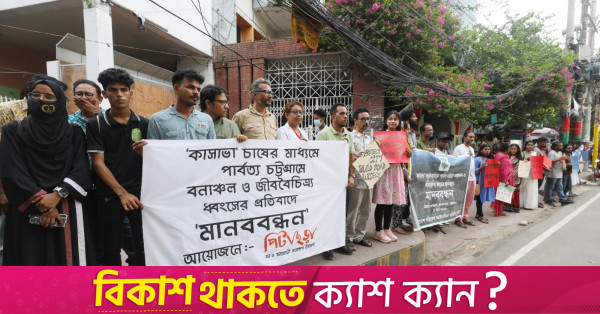Human chain calls for stopping cassava cultivation in Ctg Hill Tracts alleging forest destruction


Pittachhara Forest and Wildlife Conservation Initiatives organised the human chain programme at the Chattogram Press Club today
Environmental organisations, including Bangladesh Environmental Lawyers Association (BELA), Green Fingers, Youth Net for Climate Justice, and the River Conservation Movement joined the human chain programme organised by Pittachhara Forest and Wildlife Conservation Initiatives at the Chattogram Press Club today (11 June). Photo: TBS
“>
Environmental organisations, including Bangladesh Environmental Lawyers Association (BELA), Green Fingers, Youth Net for Climate Justice, and the River Conservation Movement joined the human chain programme organised by Pittachhara Forest and Wildlife Conservation Initiatives at the Chattogram Press Club today (11 June). Photo: TBS
Speakers at a human chain programme in Chattogram today (11 June) called for urgent action to stop cassava cultivation in the Chattogram Hill Tracts alleging that it is destroying forests.
They also urged the Asian Development Bank (ADB) to stop funding cassava farming to prevent harm to the ecosystem and biodiversity of the hill tracts.
What happened
On 20 April, a The Business Standard exclusive report titled “CHT forests being razed for cassava farming, harming biodiversity” was published.
- The report revealed the devastation caused by cassava farming in the hill tracts
- The negative impact of cassava farming on the biodiversity and ecosystem of the hill tracts came to light after the report was published
- It sparked a movement in the areas concerned
Who formed the human chain
Today’s human chain was formed by the Pittachhara Forest and Wildlife Conservation Initiatives at the Chattogram Press Club.
Environmental organisations, including Bangladesh Environmental Lawyers Association (BELA), Green Fingers, Youth Net for Climate Justice, and the River Conservation Movement, also joined.
The allegations
“Pran Agro, a concern of Pran RFL Group, and Rahman Chemicals are responsible for farming cassava in the hill tracts,” Mafuz Ahmed Russel, founder of Pittachhara Forest and Wildlife Conservation Initiatives said.
“The corporates, in association with local influential people, have destroyed more than 1,200 acres of forests and destroyed biodiversity in the Matiranga area in the last two years.”
The rebuttal
Kamruzzaman Kamal, director of Marketing at Pran-RFL Group, however, denied the allegation of farming cassava by destroying forests.
“We do not cultivate cassava on any hilly land where biodiversity can be hindered. All our farms are on plain lands,” he told The Business Standard.
On the other hand, Rezaul Karim, head of Khagrachhari Cassava Plantation at Rahman Chemical, said cassava farming has been going on in the hill tracts for the last forty years.
“We have not found any negative impact of cassava farming here as it is done on barren lands,” he added.
The concern
“If the farming cannot be stopped, soil erosion will destroy all the streams, canals, and rivers in the region, making the hill tracts unlivable for indigenous people,” Russel said.
The cassava project
The Pran cassava project was launched in 2014 through a contract farming initiative.
- A $12.5 million loan from ADB helped build a starch and liquid glucose plant in Habiganj in northeastern Bangladesh in 2013.
- The Rahman Chemical Limited’s plant is in Dhaka.
Why does it matter
All the trees and bushes were cleared to make space for cultivating cassava, locally known as Shimul Alu, a woody shrub with an edible root. Hundreds of acres of forests were razed for cassava cultivation in Matiranga and Manikchhari upazilas in Khagrachhari, with the practice expanding rapidly—nearly doubling in scope every year.
Experts warn that clearing forests for tuber crop cultivation, such as cassava, is not scientifically sound. Such agricultural practices can lead to soil erosion and heighten the risk of landslides, particularly in hilly regions.




